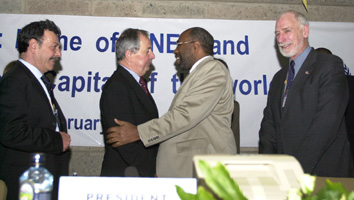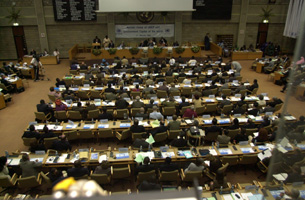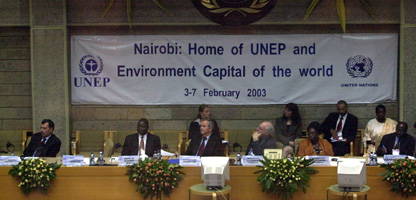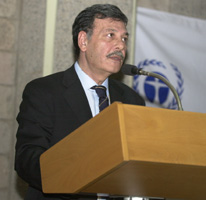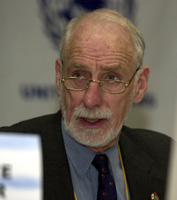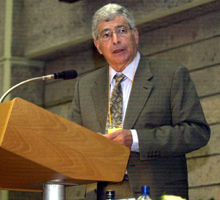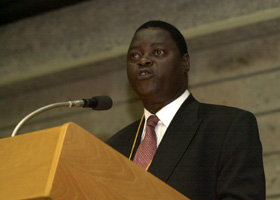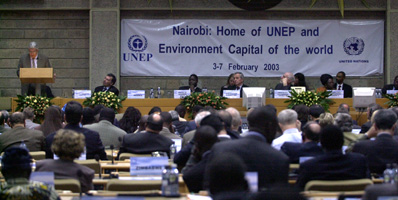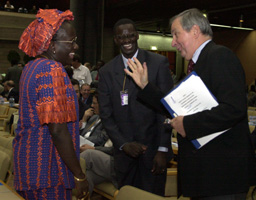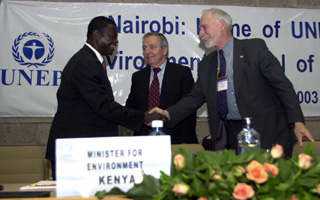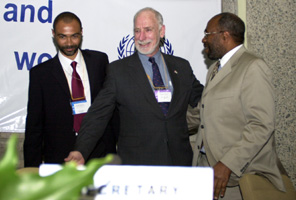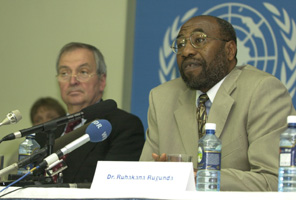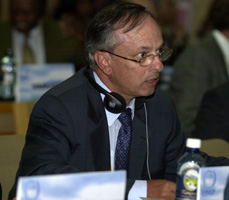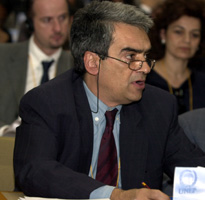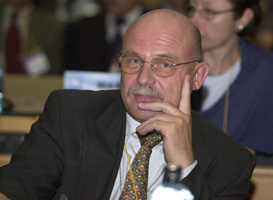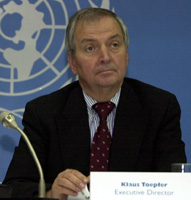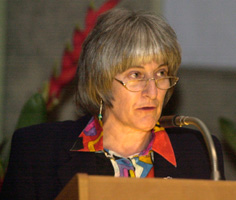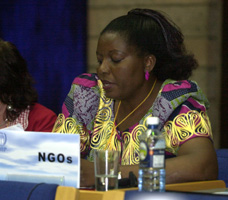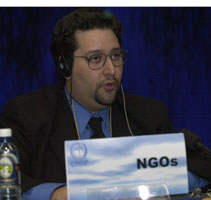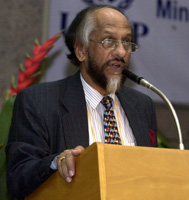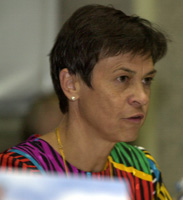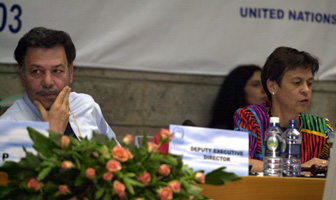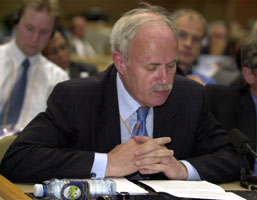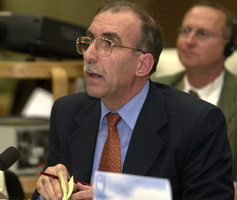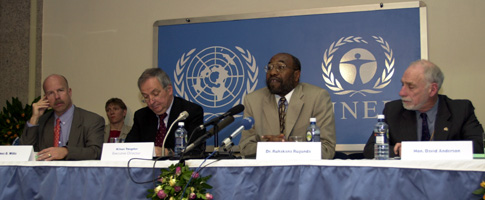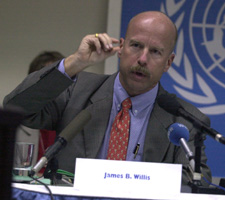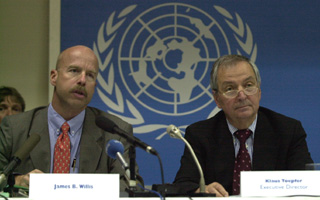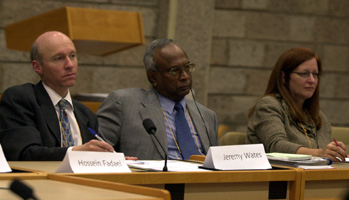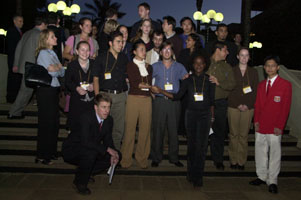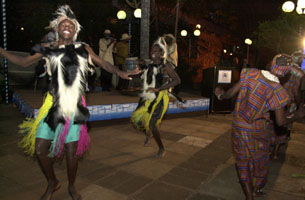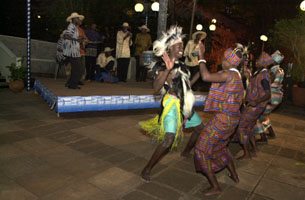|
Twenty Second Session
of the Governing Council/Global Ministerial Environment Forum Highlights from Monday, 3 February
UNEP
Deputy Executive Director Shafqat Kakakhel,
UNEP Executive Director Klaus Töpfer,
incoming Governing
Council President Ruhakana Rugunda, Minister of Water, Lands and Environment
of Uganda
and outgoing Governing Council President
David Anderson |
|
Opening Plenary
|
|
|
|
|
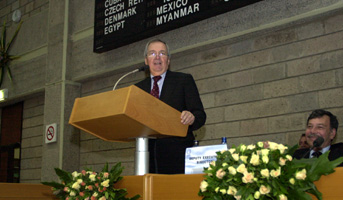 |
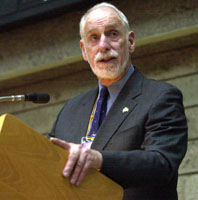 |
|
|
|
|
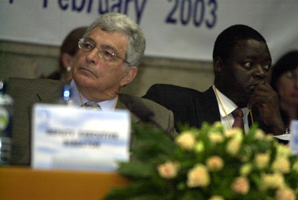 |
|
Klaus
Töpfer speaks with the delegate from Senegal (left) and Kenyan Environment
Minister Newton Kulundu
is greeted by delegates (right)
|
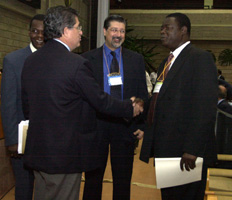 |
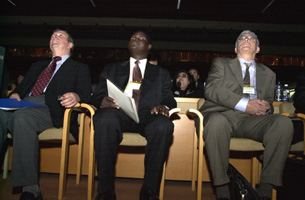 |
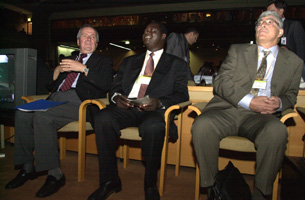 |
|
Watching
an audio-visual presentation, which stressed that, in spite of the many
challenges, action to protect our environment can be successful
|
|
Kenyan
Environment Minister Newton
Kulundu shakes the hand of outgoing GC President David Anderson
(left) and David Anderson greets new GC President Ruhakana Rugunda, Minister
of Water, Lands and Environment of Uganda (right)
|
|
Governing
Council President Ruhakana Rugunda, Minister of Water, Lands and Environment
of Uganda
|
|
Vice-President
Václav Hubinger (Czech Republic) is elected Rapporteur for the
meeting (left) and with Ambassador Finn Thilsted, Danish Embassy
|
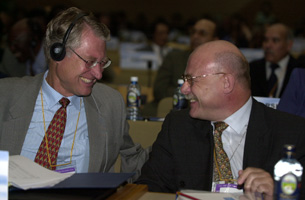 |
|
Afternoon
Plenary: Policy Issues
|
| Delegates
were briefed on the state of the environment by a UNEP representative, who
highlighted problems in many areas, including water policy, food security,
land degradation, biodiversity, climate change, and the marine environment. |
| Victor
Hugo, Center for Human Rights and Environment, Cordoba, Argentina, speaking
on behalf of the Global Civil Society Forum, expressed concern that
UNEP is "lagging behind" in its relationships with civil society.
He welcomed UNEP's strategic paper on civil society involvement, endorsed
the prompt creation of a civil society advisory panel to UNEP's Executive
Director, and proposed a UNEP initiative on cultural and biological diversity
in partnership with other institutions. |
| R.K.
Pachauri, Chair of the Intergovernmental Panel on Climate Change (IPCC),
outlined the results of the IPCC's Third Assessment Report and the predicted
effects of climate change on agriculture, health, water resources, coastal
areas, biodiversity, fisheries, food production, and hydropower generation.
He highlighted the environmental and economic benefits of regional assessments, mitigation strategies, and climate change policy making. |
|
Pakistan
emphasized its strong commitment to addressing domestic environmental
problems, but argued that efforts are offset by a lack of resources and
low technical capacity.
|
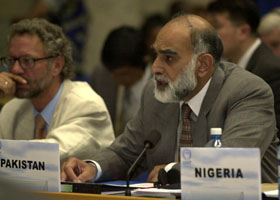 |
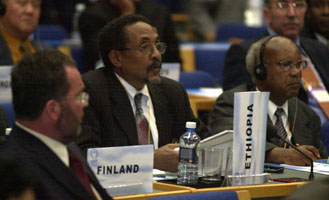 |
Ethiopia highlighted the need for effective biosafety frameworks and for defining access and benefit sharing from genetic resources, and argued that a voluntary system was inadequate. |
|
Committee
of the Whole
|
| COW Chair and GC Vice-President Tanya Van Gool (Netherlands) and UNEP Deputy Executive Director Shafqat Kakakhel (above) introduced the organization of work, outlining issues relating to: the UNEP Programme, Environment Fund, and administrative and other budgetary matters; follow-up of UNGA resolutions; and UNEP's contribution to future sessions of the CSD. Noting the limited time allocated for budgetary discussions, several delegates requested that a contact group be formed. |
| CPR
Chair Juergen Weerth (Germany) presented the draft decisions prepared
by the CPR pursuant to the mandate established by the Governing Council
(UNEP/GC.22/L/1). He noted that the document covered 30 subject areas, and
that the CPR had reached agreement on 21 of these. He said divergent views
remained on amending Rule 69 of the Council's Rules of Procedure on civil
society participation. |
|
Press
Conference on the Global Mercury Assessment
|
|
Jim
Willis, UNEP Chemicals, Klaus Töpfer, Governing Council President,
outgoing Governing Council President David Anderson, discuss the new report
released by UNEP, which states, among other things, that mercury poisoning
of the planet could be significantly reduced by curbing pollution by power
stations
|
|
Panel
Discussion on Rio Principle 10: Public Access to Information, Participation
in Decision Making and Access to Justice in Environmental Matters
|
|
Miscellaneous
Photos
|
|
The
launch of and switching on of light boxes containing a new biodiversity
display - UNEP World Conservation Monitoring Center
|
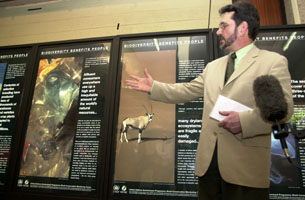 |
|
Entertainment
at an evening reception for delegates
|
|
Members
of the Global Youth Forum
|
|
Links
|
|
Back to Linkages home - Visit IISDnet
- Send e-mail to ENB |


